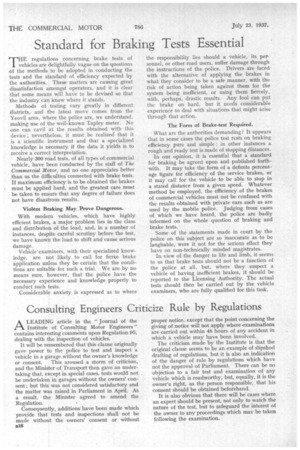Standard for Braking Tests Essential
Page 32

If you've noticed an error in this article please click here to report it so we can fix it.
THE regulations concerning brake tests of vehicles are delightfully vague on the questions of the methods to be adopted in conducting the tests and the s andard of efficiency expected by the authorities. These matters are causing great dissatisfaction ahnongst operators, arid it is clear that some meads will have to be devised so that the industry can know where it stands.
Methods of testing vary greatly in different districts, and he latest move comes from the Yeovil area, w ere the police are, we understand, making use of 1he well-known Tapley meter. No one can cavil bt the results obtained with this device ; nevertheless, it must be realized • that it is a scientific instrument and that a specialized knowledge is necessary if the data it yields is to receive a correct interpretation.
Nearly 300 rOad tests, of all types of commercial vehicle, have been conducted by the staff of The Commercial Motor, and no one appreciates better than us the difficulties connected with brake tests. If maximum efficiency is to be obtained the brakes must be applied hard, and the greatest care must be taken to endure that any degree of failure does not have disastIrous results.
Violent Braking May Prove Dangerous.
With modern vehicles, which have highly efficient brakes, a major problem lies in the class and distributioh of the load, and, in a number of instances, despite careful scrutiny before the test, we have know the load to shift and cause serious damage.
Vehicle.exa iners, with their specialized knowledge, are not likely to call for fierce brake application u ess they be certain that the conditions are suitable for such a trial. We are by no means sure, however, that the police have the necessary exp rience and knowledge properly to conduct suchests. t Considerabl anxiety is expressed as to where the responsibility lies should a vehicle, its personnel, or other road users, suffer damage through the instructions of the police. Drivers are faced with the alternative of applying the •brakes in what they consider to be a safe manner, with the risk of action being taken against them for the system being inefficient, or using them fiercely, with, perhaps, drastic results. Any fool can put the brake on hard, but it needs considerable experience to deal with situations that might arise through that action.
The Form of Brake-test Required.
What are the authorities demanding? It appears that in some cases the police test rests on braking efficiency pure and simple ; in other instances a rough and ready test is made of stopping distances.
In our opinion, it is essential that a standard for braking be agreed upon and published forthwith. It may take the form of a definite percentage figure for efficiency of the service brakes, or it may call for the vehicle to be able to stop in a stated distance from a given speed. Whatever method be employed, the efficiency of the brakes of commercial vehicles must not be confused with the results obtained with private cars such as are used by the mobile police. Judging from cases of which we have heard, the police are badly informed on the whole question of braking and brake tests.
Some of the statements made in court by the police on this subject are so inaccurate as to be • laughable, were it not for the serious effect they have on non-technically minded magistrates.
In view of the danger to life and limb, it seems to us that brake tests should not be a function of the police at all, but, where they suspect a vehicle of having inefficient brakes, it should be reported to the Licensing Authority. The actual tests should then be carried out by the vehicle examiners, who are fully qualified for this task.




























































































